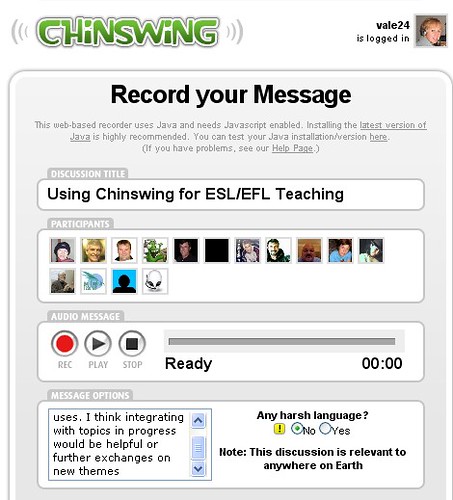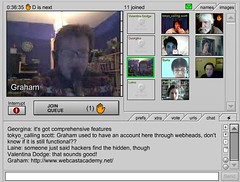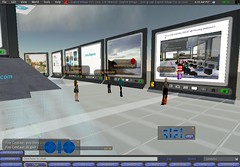
On 02/02/07 (midnight my time) we were privileged to be able to hear Alex Hayes involved in LearnScope projects across NSW talk and showcase social software usage in these projects. “Webpublishing is a clear and defined objective.”
Bee, Berta, Patricia, Gerogina, Anne, Laine and a few other OWP names were there.
It was very interesting first to use this new real-time software that I have seen demos of and analysezd features of but never actually used synchronously in order to compare it with live chat rooms I’m familair with (LearningTimes, Blackboard, Vyew). Until the 01 Feb 2007 it was known as Breeze but since 01/02/07 (i.e 24hours before our session!) it became known as Adobe Acrobat Connect
It’s a rich platform for synchronous sessions.
- Good professional layout with nice easy push buttons to ask for microphone and split windows.
- Alex referred to is as very “democratic” because participants could also resize presenter’s windows. I think I would disagree with this definition. It’s not that democratic because it’s a paid for service!! It’s very professional.
- We were participating as presenters and had been given access to the chat room via a shared link (no password) but one can set this up so that participants need a password and cannot share the applications (PPT slides or browser unless granted permission by moderator)
- We were all “presenters” as it were and that yes, was very democratic of Alex. Thanks! With a larger, less experienced, group it could have lead to collapsing windows.
It’s nice to have shared browsing and although I thoroughly enjoyed the talk and this learning opportunity I found that the shared browsing didn’t work so well on this occasion and caused problems:
- some degree of detachment
- text too small,
- passage from web page to web page too fast to actually appreciate more than the basic layout and a few pics or headings. (Maybe I’m used to active web browsing, meandering round a wikispace to observe all the hard work and collaborative efforts that have gone on behind the scenes in my own way, in my own time, in an hour it is not possible to cover all that. )
Alex did a great job but I’m wondering about this quantity and exposing remote participants in this way.
I feel that a presenter, in this situation, is best
- outlining projects in a different way (not only verbally) and
- providing URL for later individual enjoyment and greater engagement.
- talking thorugh key points on a whiteboard or slide or
- ensuring that the webpage opens full screen (which then loses the sidebar chat – a disadvantage)
I think Laine, may agree with me here as she said in the text chat she felt confuse. The audio on Alex’s microphone was not of constant high quality adding to the distancing of the experiencing and the need for better visuals.
However, don’t get me wrong the session was extremely successful and enjoyable in extending networks and really interesting from the point of view of seeing how funding and technology can assist some brilliant projects and connect people. A real example of knowledge sharing.
It was also a special moment to actually hear a moblogger (mobile blogger) speak “live”!
Alex said he started out with photo blogging and then moved to expressing himself in text. A lot of his work is done on the go. This is a form of technology and use of technology that is very avant-guard here in Italy. He showed us how the use of Flikr captured their learning journey http://www.flickr.com/photos/tags/nswlearnscope06
Some important issues were also mentioned about protecting and preserving indigenous languages through mp3 recordings and podcasting. The public photo or storage of voice recordings has met with many problems in mobile blogging projects. It is crucial that people’s traditions are respected and if the capturing of an image of oneself or the archiving of a voice of someone who has passed away is considered by that community as unacceptable then that must obviously be respected. There is, of course also, a generation aspect to this – younger learners being more interested in becoming involved and exploring new traditions, more open to change? But the older members of the community need to be part of the decision making process for any project like this to work and Alex explained how they worked in a “watermark” system for granting permission for photos to be used. This protection is in the hands of the community and it great to analyse all this from the point of view of open and participatory (of our past few weeks) I need to find out more about what Alex said on Creative Common’s.
We also got the chance (very helpful) to see how Alex has set up and uses Bloglines for aggregating the thousands of feeds all his projects are using . He shared his bloglines public space http://www.bloglines.com/public/alexanderhayes
Superb example of folder management and an excellent way to consolidate and see in action more examples of what we have been examining over the past two weeks.
Problems with Bloglines, mentioned by Alex :
- That the interface does not allow you to view all the updates on one window.
- You can see changes marked by individual feeds – to view you need to click that feed.
He mentioned that Planet TALO does this so I’m off to investigate. Another feed scraper (I liked this term!) was a community based portal called www.zimbio.com. Another one for the comparative analysis tasks that I have set myself!
Another interesting thing was the way they had used a Google calendar in their wiki to make even scheduling visits more collaborative – less of a top down approach
Also nice to see great “HowTo“ links and their idea of sending a Web Office Tool Kit to everyone involved in projects seemed great.
Well the key words : teams, collaborating, networks and also unpredictability. One mobile bloggers choice for their “personal identity” activities showed that 😉
Connections and conversations http://www.nswlearnscope.com/
Loads of scope for learning… Thanks ALex, Bee, Patricia and Georgian for arranging this session 😉









